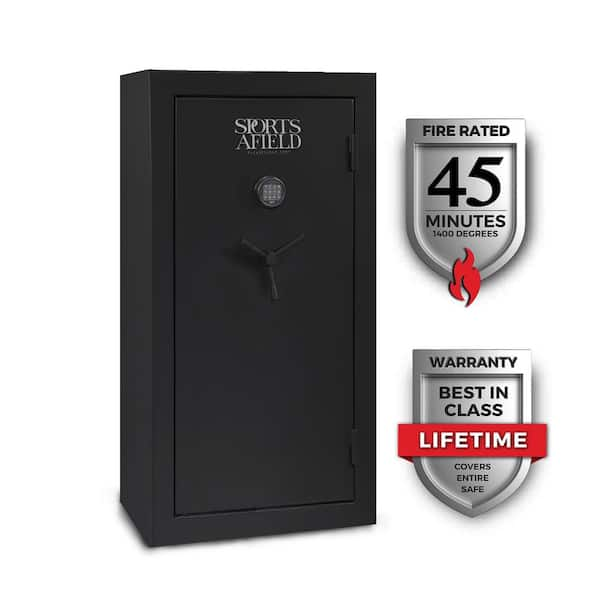When you invest in a fireproof rifle safe, you expect it to protect your valuable firearms from fire damage. But have you ever wondered if that’s enough?
What about moisture inside the safe that could cause rust or corrosion? You might be asking yourself, “Do fireproof rifle safes need dehumidifiers to keep my guns truly safe? ” This question is more important than you think. If you want to keep your firearms in perfect condition, understanding the role of dehumidifiers inside your safe can make all the difference.
Keep reading to discover why this small addition could save your collection from hidden damage.
Fireproof Rifle Safes Basics
Fireproof rifle safes protect your firearms from extreme heat and flames. They keep your rifles safe during a fire emergency. These safes use special materials and designs. Their goal is to prevent heat from damaging the guns inside.
Understanding what makes a safe fireproof helps you choose the right one. Not all safes offer the same level of protection. Knowing the basics about fireproof safes can help you protect your valuable firearms better.
What Makes A Safe Fireproof
A fireproof safe resists high temperatures and flames. It has special insulation inside the walls. This insulation stops heat from reaching the inside quickly. The door seals tightly to keep smoke and heat out. The design slows down fire damage, giving you time to save your guns.
Materials And Construction
Fireproof safes use thick steel for strength. Inside, fire-resistant materials like gypsum or concrete are common. These materials absorb heat and protect the contents. The door has heat seals made of special rubber. These seals expand in fire to block heat and smoke. Strong hinges and locks keep the safe secure during a fire.
Common Fire Ratings
Fire ratings show how long a safe can resist fire. Ratings are in minutes, such as 30, 60, or 120 minutes. The number means the safe can protect contents for that time. Some safes protect against very high heat, over 1200°F. Look for safes tested by official labs. These tests ensure real fire protection.

Moisture Concerns Inside Safes
Moisture inside a fireproof rifle safe can cause serious problems. Even the best safes protect from fire but may not stop humidity. Moisture can build up inside the safe, especially in damp places or changing weather. Understanding moisture concerns helps keep firearms safe and in good condition.
Sources Of Moisture
Moisture enters safes through several ways. Wet clothes or gear stored inside add dampness. Air inside the safe holds humidity that changes with temperature. Poor ventilation traps moist air. Rain or snow on firearms can also bring water inside.
Effects On Firearms
Humidity damages metal parts of firearms. Rust and corrosion form over time. Wood stocks can swell or crack. Moisture harms gun oils and finishes. These effects reduce firearm reliability and value.
Signs Of Humidity Damage
Look for rust spots or discoloration on metal. Wood may feel sticky or soft. A musty smell inside the safe signals mold growth. Difficulty in moving parts can mean corrosion. Early detection stops further damage.
Role Of Dehumidifiers
Dehumidifiers play an important role in protecting rifles stored in fireproof safes. These safes keep guns safe from fire, but moisture can still cause damage. Moisture leads to rust and corrosion, which harm metal parts. Dehumidifiers help control humidity inside the safe. They create a dry environment that keeps rifles in good condition.
Using a dehumidifier inside a fireproof safe can extend the life of your firearms. It keeps the air dry and reduces moisture buildup. Understanding how these devices work and which types suit safes best helps you protect your rifles better.
How Dehumidifiers Work
Dehumidifiers remove moisture from the air. They pull in humid air and cool it down. Water collects and drips into a tray or drains out. Then, dry air flows back inside the safe. This process lowers humidity to safe levels. It prevents rust and mold growth on rifles and ammo.
Types Suitable For Safes
Small electric dehumidifiers fit well in rifle safes. They use low power and run quietly. Silica gel packs are another option. These absorb moisture naturally and need replacing or recharging. Some safes come with built-in dehumidifiers. Choose one that fits your safe size and budget.
Benefits For Rifle Storage
Dehumidifiers keep rifles rust-free and ready to use. They protect wood stocks from swelling or cracking. Ammo stays dry and safe to fire. Dehumidifiers also reduce musty smells inside the safe. This keeps your storage clean and healthy for long-term use.

Do Fireproof Safes Need Dehumidifiers?
Fireproof rifle safes protect guns from high heat and flames. But fire is not the only threat. Moisture inside a safe can cause rust and damage to firearms. Many gun owners wonder if they need dehumidifiers inside their fireproof safes. This section explains the need for dehumidifiers and how to keep guns safe from humidity.
Fireproof Vs. Waterproof Considerations
Fireproof safes resist heat and fire damage. They do not always stop water or moisture. Some safes are waterproof or water-resistant. Fireproof safes may still allow humidity inside. Water from firefighting efforts can get into the safe. Moisture can build up inside the safe over time. This makes it important to think about humidity control.
Assessing Humidity Risks
Humidity can cause rust and corrosion on firearms. Guns kept in a safe for a long time face this risk. Areas with high humidity increase this problem. A dehumidifier absorbs moisture and keeps air dry. Without it, metal parts may degrade. Using a dehumidifier in a fireproof safe helps protect guns from moisture damage.
Manufacturer Recommendations
Many safe makers suggest using dehumidifiers. They know fireproof safes are not always airtight. Some safes come with built-in moisture control features. Follow the manufacturer’s advice for best results. Using approved dehumidifiers prevents damage to the safe and contents. Check manuals or contact makers for specific guidance.
Alternative Moisture Control Methods
Keeping moisture out of a fireproof rifle safe is important for gun care. Dehumidifiers are common but not the only option. Some alternative ways can help control moisture inside the safe. These methods are simple and cost-effective.
Silica Gel Packs
Silica gel packs absorb moisture from the air. They are small and easy to place inside the safe. These packs help keep the air dry. Change them regularly to keep them effective. Silica gel is safe and does not harm your guns.
Activated Charcoal
Activated charcoal works by trapping moisture and odors. It can be placed in small bags inside the safe. This method also helps reduce musty smells. Replace the charcoal every few months. It is a natural and affordable option.
Safe Ventilation Options
Proper ventilation stops moisture buildup inside the safe. Some safes have built-in vents with filters. You can also use a small fan for air circulation. This keeps the safe dry and prevents rust. Ensure vents block dust and insects.
Maintenance Tips For Fireproof Safes
Proper maintenance keeps a fireproof rifle safe in good condition. It protects your firearms and valuables from damage. Simple steps help prevent rust, moisture, and wear. Regular care extends the life of your safe and its contents.
Regular Inspections
Check your safe’s exterior and interior often. Look for signs of rust, dents, or scratches. Make sure the door seals tightly without gaps. Test the lock to ensure it works smoothly. Early detection of problems prevents costly repairs.
Cleaning And Care
Use a soft cloth to wipe the safe’s surface. Avoid harsh chemicals that can damage the finish. Clean the interior with a dry cloth to remove dust. Keep the locking mechanism free of dirt. Lubricate hinges lightly if they squeak or stiffen.
Monitoring Humidity Levels
Moisture inside a safe causes rust and mold. Use a small hygrometer to check humidity levels. Ideal humidity stays below 50 percent. Consider dehumidifiers or moisture absorbers if needed. Proper humidity control protects your firearms and documents.
Choosing The Right Safe Accessories
Fireproof rifle safes protect your guns from heat and fire. But they do not stop moisture inside. Moisture can cause rust and damage over time. Adding the right accessories helps keep your safe dry and your rifles safe.
Selecting the best accessories depends on your needs and budget. Knowing the difference between options makes the choice easier. Let’s explore popular accessories to keep your safe free from moisture.
Dehumidifiers Vs. Desiccants
Dehumidifiers remove moisture from the air inside the safe. They often plug into power and work automatically. Some models also have fans to circulate air.
Desiccants absorb moisture without electricity. Common types include silica gel packs and clay packets. They need replacing or recharging regularly to stay effective.
Dehumidifiers offer constant protection but cost more. Desiccants are cheaper but require more care. Choose based on your safe size and how much effort you want to spend.
Smart Humidity Controllers
Smart humidity controllers monitor moisture levels inside the safe. They turn dehumidifiers on or off as needed. Some models send alerts to your phone.
These devices save energy and keep humidity steady. They are great for large safes or humid climates. You get better control without checking the safe often.
Budget-friendly Options
Simple moisture absorbers like silica gel packs cost little. They fit easily inside any safe and work quietly. Replace them every few months for best results.
DIY solutions include moisture-absorbing containers or small charcoal bags. These help reduce humidity without high costs. They suit small safes or light use.
Investing in basic accessories is better than risking rust and damage. Protect your rifles with affordable, easy-to-use options.

Frequently Asked Questions
Do Fireproof Rifle Safes Prevent Moisture Buildup?
Fireproof rifle safes protect against heat but do not fully prevent moisture buildup. Moisture can still accumulate inside, risking rust and corrosion on firearms.
Why Use Dehumidifiers In Rifle Safes?
Dehumidifiers reduce moisture inside rifle safes, preventing rust and mold growth. They help maintain optimal humidity levels, protecting firearm condition over time.
Can Rust Form In Fireproof Rifle Safes?
Yes, rust can form if moisture is present inside fireproof safes. Fireproofing does not eliminate humidity, so moisture control is essential to prevent rust.
Are Dehumidifiers Necessary For All Rifle Safes?
Not always, but highly recommended. If your safe lacks proper ventilation or is in a humid area, using a dehumidifier is crucial to protect firearms.
Conclusion
Fireproof rifle safes protect guns from fire but not from moisture. Moisture can cause rust and damage inside the safe. Using a dehumidifier helps keep the air dry and your guns safe. It is a smart step to avoid problems later.
Choose a dehumidifier that fits your safe’s size. Regularly check and maintain it for best results. Protect your guns fully by controlling both fire and moisture risks. Safe and dry. Simple and smart.

